Housing Market bubble part 2, this time due to foreign investors -- via the Miami Herald:
In Miami, secretive buyers often purchase expensive homes using opaque legal entities such as offshore companies, trusts and limited liability corporations.
Offshore companies are legal as long as the companies declare their assets and pay taxes. But the secrecy that surrounds those companies makes it easy and tempting to break the law.The U.S. Treasury Department is so concerned about criminals laundering dirty money through Miami-Dade County real estate that in March it started tracking the kind of transaction most vulnerable to manipulation: shell companies buying homes for at least $1 million using cash.
Those deals are considered suspicious because a) the real buyers can hide behind shell companies and b) banks aren’t involved in cash transactions, circumventing any checks for money laundering.Even a former Supreme Court Justice from Brazil is allegedly involved according to the MH:
Cash deals accounted for 53 percent of all Miami-Dade home sales in 2015 — double the national average — and 90 percent of new construction sales, according to the Miami Association of Realtors.
“A property owned in the name of a shell company is not transparent,” said Jennifer Shasky Calvery, director of the U.S. Financial Crimes Enforcement Network (FinCen), the Treasury agency behind the new policy. “There may be legitimate reasons to be non-transparent, but it’s also what criminals want to do.”
The temporary initiative also applies to Manhattan and expires in August. It requires that real-estate title agents identify the true, or “beneficial,” owners behind shell companies and disclose their names to the federal government. In Miami-Dade, the rules apply to homes sold for $1 million or more. In Manhattan, where real estate is more expensive and where foreign buyers also flock, the threshold is $3 million.
No other jurisdictions are being targeted.
When Brazilian news outlets found out then-Supreme Court chief justice Joaquim Barbosa had bought a Brickell condo in 2012, they asked the well-respected jurist how much he paid.
Barbosa refused to say.
The problem? In Florida, real-estate sales are public.
But not Barbosa’s.
Miami-Dade County property records seemed to suggest the 61-year-old paid a big, fat zero for his one-bedroom condo at Icon Brickell, one of the trendy neighborhood’s best-known condo towers.
Buyers are supposed to pay a documentary stamp tax when they close on a property. In Miami-Dade, the tax amounts to 60 cents for every $100 paid for the property. Sales prices aren’t listed on deeds — but they can be calculated from the tax.
The deed for Barbosa’s unit lists no tax. (Even when someone gives their property away to a family member, they pay a nominal tax.)As it turns out, Barbosa didn’t get the apartment for free. The unit’s seller sent the Miami Herald a contract showing Barbosa paid $335,000 in cash. The tax on that sale would have amounted to about $2,000.
Three real-estate attorneys consulted by the Miami Herald could see no reason why Barbosa wouldn’t be subject to the tax.
“This is a very unusual deed,” said one of the attorneys, Joe Hernandez of South Florida law firm Weiss Serota.
It’s not clear why the Florida Department of Revenue didn’t flag the nonpayment and impose a fine. A spokeswoman said the department could not comment on individual cases.
Details of Barbosa’s purchase came to light after a massive leak of documents from inside Panamanian law firm Mossack Fonseca.

